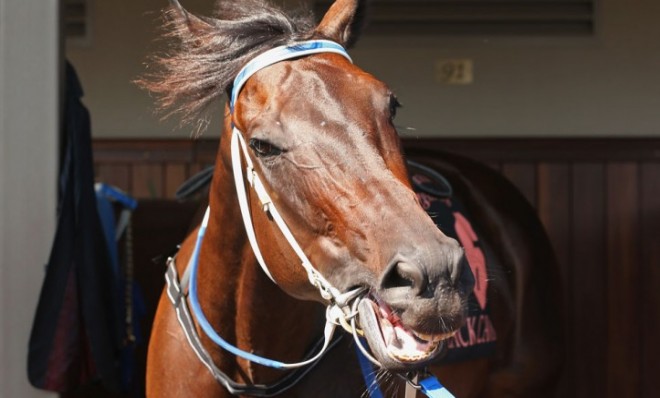The week in words
From horse idioms to ATMs that speak Cockney rhyming slang, the highlights from our favorite language blogs and the latest in word news and culture

A free daily email with the biggest news stories of the day – and the best features from TheWeek.com
You are now subscribed
Your newsletter sign-up was successful

Earlier in the week, the Oxford Dictionaries blog celebrated Presidents' Day by comparing the language of President Obama's inaugural address to that of Abraham Lincoln's time. Slate showed us the president's handwritten edits of his speech, and The Atlantic discussed dialect and when presidents say "y'all."
OxfordWords also explored guest and host words, the genetic lexicon, and horse idioms and proverbs. In addition, they explained when wrong usages become right. Meanwhile, Mental Floss told us about seven words that came about from people getting them wrong.
Ben Zimmer talked about the Boston accent on The Today Show, and on the Visual Thesaurus discussed dating and grammar and sequester and sequestration. Jen Doll explored word lengthening and texting (yaaaaay!)
The Week
Escape your echo chamber. Get the facts behind the news, plus analysis from multiple perspectives.

Sign up for The Week's Free Newsletters
From our morning news briefing to a weekly Good News Newsletter, get the best of The Week delivered directly to your inbox.
From our morning news briefing to a weekly Good News Newsletter, get the best of The Week delivered directly to your inbox.
Stan Carey looked at peppercorn rent and the controversy that has arisen in the UK when "a Teesside school principal asked parents to 'correct' their children's informal speech – phrases such as it's nowt (it's nothing), I seen (I saw, I have seen), and gizit ere (give us it here = give it to me)." The Dialect Blog had a thing or two to say about it too. In other dialect news, ATMs in East London now speak Cockney rhyming slang.
At the Macmillan Dictionary blog, Stan centered on centre around and Michael Rundell honored International Mother Tongue Day by writing about language, culture, and the dominance of English.
The Virtual Linguist explained the difference between cloud-cuckoo-land and the Land of Cockaigne, and meteor and meteorite. (And in case you missed the amazing videos of the meteor blast over Russia, here's a roundup from Mashable.)
At Language Log, Mark Liberman was severely positive. At Lingua Franca, Ben Yagoda swang and missed, Allan Metcalf explained the grammar of newspaper headlines, and Geoffrey Pullum defended the "monstrous" adverb.
A free daily email with the biggest news stories of the day – and the best features from TheWeek.com
Fritinancy explored the recent proliferation of Xs and Os and the fictional drug brand name, Ablixa. In words of the week, her selections were dudeoir, male boudoir photography, and doxing, "the practice of investigating and revealing a target subject's personally identifiable information, such as home address, workplace information and credit card numbers, without consent."
Erin McKean noted jammer, a skater on a roller derby team who "tries to lap the other team's skaters"; jughandle, a type of traffic-control feature; anddecalcomania, in art, "two wet surfaces pressed together and then pulled apart."
The Word Spy spotted second screening, "using a mobile device to monitor and post social media comments about what you are watching on TV or at the movies," and sick-lit, "a literary genre that features individuals dealing with fatal or devastating diseases."
Arnold Zwicky discussed his dislike for National Grammar Day. Photographer Ellen Susan proposed a new punctuation mark while College Humor suggested eight new and necessary punctuation marks.
In language news, a new Yiddish dictionary is being released, as well as a new look for Harry Potter trade paperbacks. Melville House told us about Whale Words, Flavorwire rounded up literary characters inspired by real famous people, and NPR interviewed Paula Byrne, the author of The Real Jane Austen.
This week we learned that plain and simple language doesn't always equal the truth, men and women use uptalk differently, and why tongue twisters are hard to say. We groaned over these disastrous mistranslations. We loved this history of dog names, this etymology of the mother of all curse words, and this explanation of the two types of linguists (hint: at Wordnik we're mostly type 2).
Finally, our favorite website of the week was Introverted Fairy Tales:
Once upon a time there was a young woman called Belle who fell in love with a library. Sure, there was a guy and a rose and a particularly talkative tea set, but mostly there were books. And they all lived happily ever after.
More from Wordnik...
* The words of Downton Abbey, season 3
Angela Tung's essays on language and culture have appeared at Mental Floss, Quartz, Salon, The Week, The Weeklings, and Wordnik. Her personal essays have appeared at The Frisky, The Huffington Post, and elsewhere.